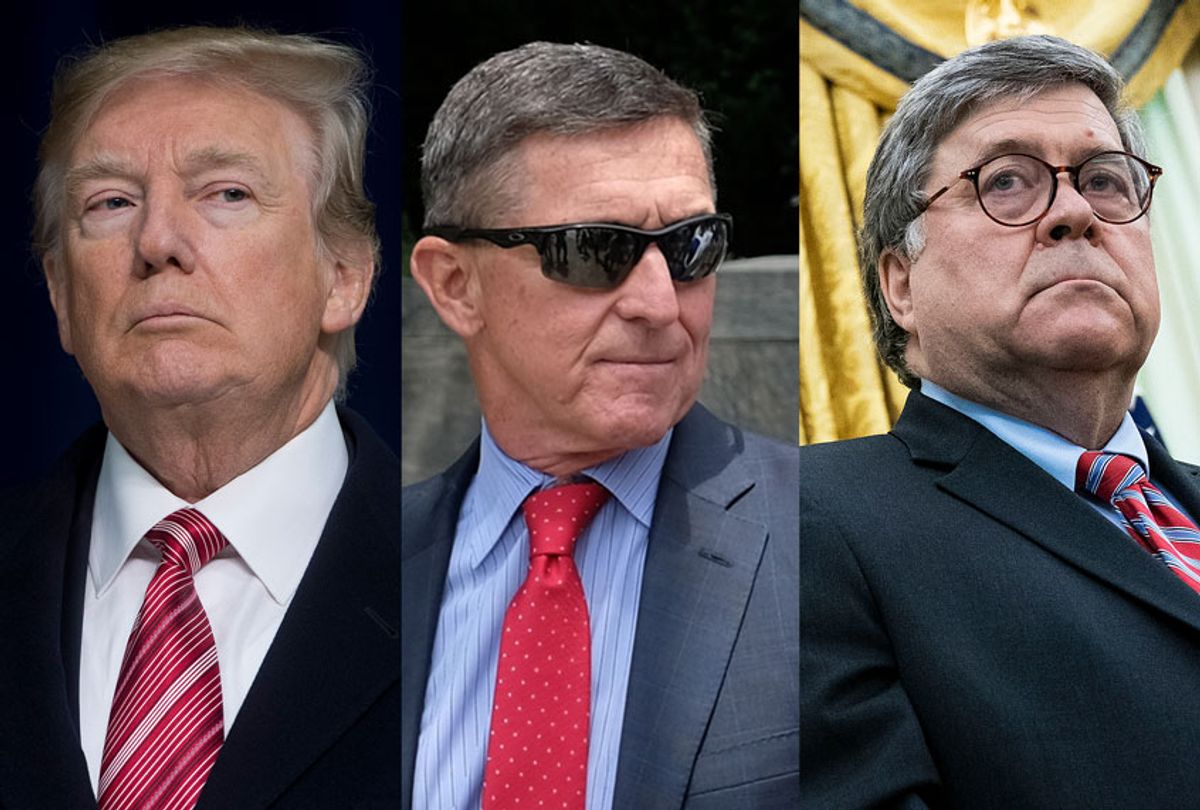The D.C. Circuit Court of Appeals on Wednesday ruled in a 2-1 opinion that a federal judge must grant the Department of Justice's extraordinary request to drop criminal charges against former Trump national security adviser Michael Flynn.
The ruling may continue the legal battle to decide the outcome of the politically-charged case, whose about-face stunned prosecutors across the country.
Federal prosecutors filed the request with the D.C. District Court in May at the direction of Attorney General William Barr, arguing that the FBI had no legal basis to conduct the January 2017 interview where Flynn, according to his own guilty plea, lied about his contacts with former Russian Ambassador Sergei Kislyak.
The extraordinary move flummoxed District Judge Emmett Sullivan, the federal judge in charge of Flynn's sentencing, who took the unusual step of formally requesting a retired judge's outside opinion. Though Sullivan has yet to issue his ruling, Flynn's attorneys filed an emergency appeal to the appellate court.
Despite the court's decision, the trial is not over. Sullivan can still choose to submit Flynn's sentencing to a vote in front of the full 12-panel appellate court, and it remains possible the case may rattle its way up to the Supreme Court.
Soon after the opinion was released, President Donald Trump, who has for years bitterly defended his former adviser, tweeted: "Great! Appeals Court Upholds Justice Departments Request To Drop Criminal Case Against General Michael Flynn!" [sic]
Writing for the majority, Circuit Judge Neomi Rao — whom Trump appointed in November 2018 to fill the seat vacated by Brett Kavanaugh's ascension to the Supreme Court — accepted the government's premise on its face.
"On the record before the district court, there is no clear evidence contrary to the government's representations," Rao wrote, adding that Sullivan's arguments to further examine the case were "insufficient."
Dissenting Judge Robert Wilkins, an Obama appointee, wrote that the court had "grievously" overstepped its authority by forcing Sullivan to drop the case before he even ruled on it.
The majority "set aside this court's well-established and well-founded concern for the maintenance of the ordinary course in order to proceed in an unprecedented manner," he wrote.
Flynn twice pleaded guilty in federal court to lying to government investigators about his conversations with Kislyak before Trump took office. The president fired him as national security adviser weeks into the administration, saying Flynn squandered his trust when he lied about the conversations to the vice president.
Barr's move to drop the case in the face of Flynn's guilty pleas sent shockwaves through the legal world, with nearly 1,200 former Justice Department prosecutors and officials, in addition to other legal experts, signing on to a petition to encourage Sullivan to hear the case out.
Rao wrote that any such move "to scrutinize the reasoning and motives" of Justice Department officials could "constitute irreparable harms that cannot be remedied on appeal."
"There is nothing in the public record to justify this dismissal," former U.S. attorney Barbara McQuade told Salon. "Flynn lied to the FBI about undermining U.S. foreign policy with Russia."
"The internal strategy discussions of the FBI do nothing to negate that fact," she added.
Barr, for his part, claimed to CBS News last month that "people sometimes plead to things that turn out not to be crimes."
"And the Department of Justice is not persuaded that this was material to any legitimate counterintelligence investigation," he added at the time. "So it was not a crime."
The former federal judge tapped to advise Sullivan on the case took issue with Barr, writing in a brief filed June 10 that the request to drop the case was "a gross abuse of prosecutorial power" in an attempt to "provide special treatment" to a "political ally of the president of the United States."
Hours after the circuit court ruled on the Flynn case, Aaron Zelinsky, a top Department of Justice prosecutor who worked on former special counsel Robert Mueller's case against Roger Stone, testified to Congress that the political provocateur's sentencing was politicized.
"I was also told that the acting U.S. attorney was giving Stone such unprecedentedly favorable treatment, because he was 'afraid of the president,'" Zelinsky said in his prepared testimony.



Shares